

Google Creative Labs Launches Coder To Turn Raspberry Pi Into A Basic Web Development Platform. Coder, a new project that’s coming out of Google’s Creative Lab, is an open source tool that allows you to easily turn a Raspberry Pi into a basic web server with a web-based development environment.
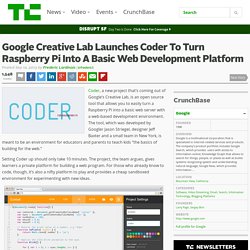
The tool, which was developed by Googler Jason Striegel, designer Jeff Baxter and a small team in New York, is meant to be an environment for educators and parents to teach kids “the basics of building for the web.” Setting Coder up should only take 10 minutes. The new computing curriculum. Switched on ICT author, Miles Berry, gives his reaction to the new Programme of Study for Computing.
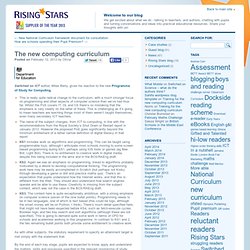
This is really quite radical change to the curriculum, with a much stronger focus on programming and other aspects of computer science than we’ve had thus far. Whilst the PoS covers IT, DL and CS there’s no mistaking that the emphasis is very clearly on the latter of these. This is challenging as it’s going to mean teachers are teaching things most of them weren’t taught themselves, even many secondary ICT teachers.The name of the subject changes, from ICT to computing, in line with the recommendations from the Royal Society’s Shut Down or Restart report in January 2012.
However the proposed PoS goes significantly beyond the minimum entitlement of a rather narrow definition of digital literacy in that report.KS1 includes work on algorithms and programming. The End of the Web, Search, and Computer as We Know It. Illustration: Ross Patton/Wired People ask what the next web will be like, but there won’t be a next web.
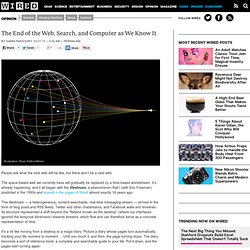
The space-based web we currently have will gradually be replaced by a time-based worldstream. It’s already happening, and it all began with the lifestream, a phenomenon that I (with Eric Freeman) predicted in the 1990s and shared in the pages of Wired almost exactly 16 years ago. This lifestream — a heterogeneous, content-searchable, real-time messaging stream — arrived in the form of blog posts and RSS feeds, Twitter and other chatstreams, and Facebook walls and timelines.
Its structure represented a shift beyond the “flatland known as the desktop” (where our interfaces ignored the temporal dimension) towards streams, which flow and can therefore serve as a concrete representation of time. UK ICT Curriculum. Google Creative Labs Launches Coder To Turn Raspberry Pi Into A Basic Web Development Platform. 'Master' computing teachers recruited to train others. 22 January 2014Last updated at 10:44 ET The aim is to give pupils the right skills for the jobs of the future A network of 400 "master" computer science teachers is being recruited to deliver a new computer science curriculum in schools across England.
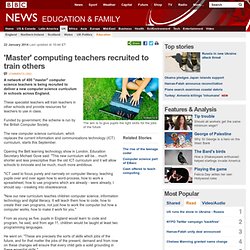
These specialist teachers will train teachers in other schools and provide resources for teachers to use in class. Funded by government, the scheme is run by the British Computer Society. The new computer science curriculum, which replaces the current information and communications technology (ICT) curriculum, starts this September. Opening the Bett learning technology show in London, Education Secretary Michael Gove said: "This new curriculum will be... much shorter and less prescriptive than the old ICT curriculum and it will allow schools to innovate and be much, much more ambitious.
"Now our new curriculum teaches children computer science, information technology and digital literacy. New projects test how technology can boost learning. 31 October 2013Last updated at 21:00 ET By Judith Burns BBC News education reporter Ways of using technology to boost learning in schools will be "rigorously evaluated" An inner city primary is at the heart of a project to test how technology can be used to boost children's learning.
Rosendale Primary, in south London, won a £253,000 grant for the research which will involve 1,400 pupils in 24 schools in London, Essex and Manchester. Rosendale pupils use tablet computers to photograph their work and tag it with notes about how well they learned. The Lambeth school's head teacher, Kate Atkins, says the aim is to help pupils develop a range of learning strategies. "Poor learners are often over-confident about the power of their memories and can struggle to find alternative strategies. Emotional reaction "We need to encourage them to think about how they learn and to try something else. " Children at the school are encouraged to reflect on every piece of work or unit of learning. 'Flipped learning' Kodu. Kodu is a new visual programming language made specifically for creating games.
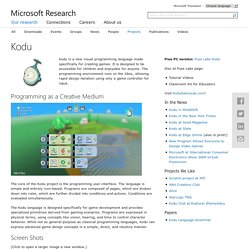
It is designed to be accessible for children and enjoyable for anyone. The programming environment runs on the Xbox, allowing rapid design iteration using only a game controller for input. Kodu Game Lab - Microsoft Research FUSE Labs. An overview of Kodu.
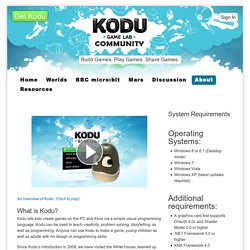
(Click to play) Kodu lets kids create games on the PC and Xbox via a simple visual programming language. Kodu can be used to teach creativity, problem solving, storytelling, as well as programming. Anyone can use Kodu to make a game, young children as well as adults with no design or programming skills. Since Kodu's introduction in 2009, we have visited the White House, teamed up with great groups like NCWIT and DigiGirlz, inspired academic research and been the subject of a book (Kodu for Kids). KODU.